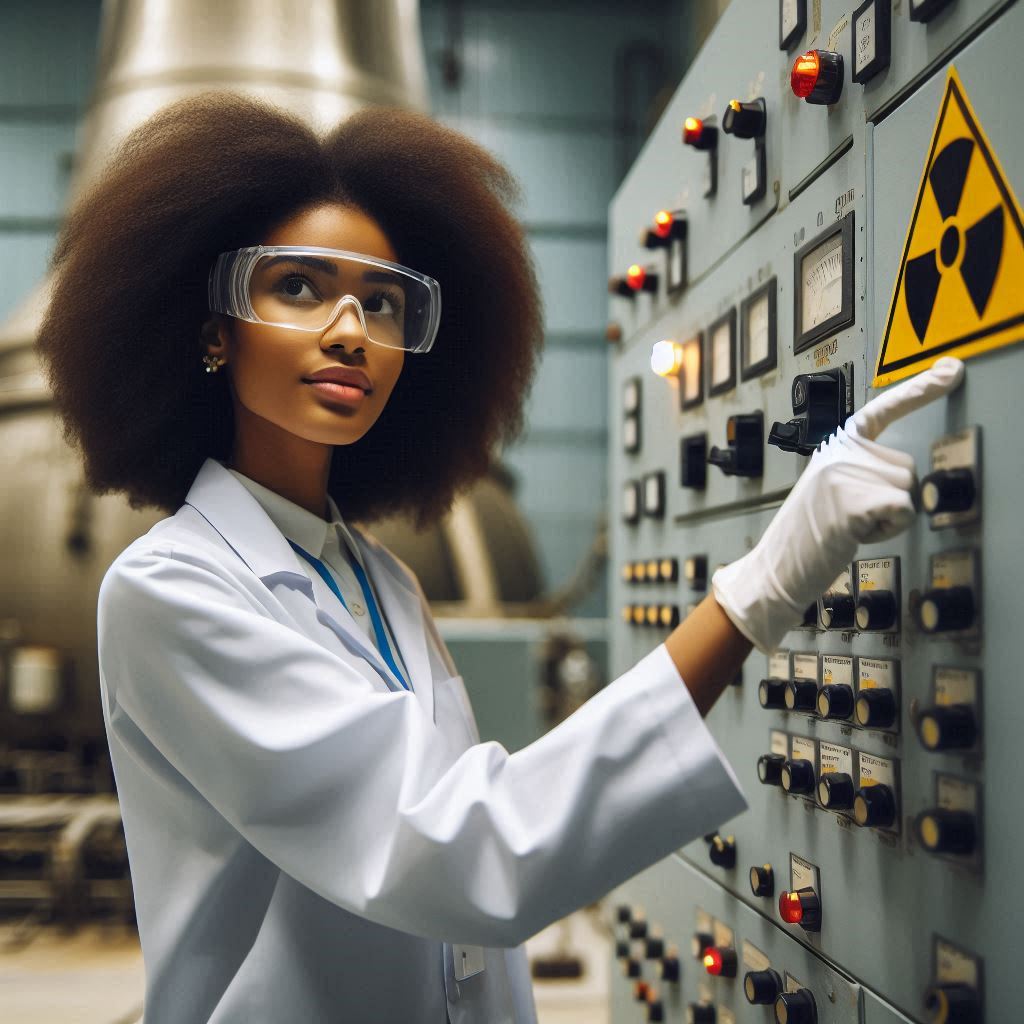Introduction
Nuclear science programs play a vital role in advancing technology and addressing energy challenges.
These programs focus on nuclear engineering, radiological science, and radiation therapy.
They prepare students for careers in research, healthcare, and energy production.
With the growing demand for sustainable energy solutions, nuclear science is increasingly relevant.
Choosing the right university for nuclear science is crucial for aspiring professionals.
A strong program offers essential coursework, hands-on experience, and research opportunities.
Students need to evaluate each university‘s faculty, facilities, and industry connections.
The right university can significantly enhance learning and career prospects.
Many universities provide specialized nuclear science programs.
These programs often feature interdisciplinary studies, blending physics, engineering, and environmental science.
Students engage in laboratory work and field studies, reinforcing theoretical knowledge.
Universities also foster collaboration with industry leaders, giving students exposure to real-world applications.
Accreditation is another important factor to consider.
Accredited programs ensure that universities meet high educational standards.
This accreditation often impacts job opportunities and graduate education options.
Many employers prefer graduates from accredited programs due to their rigorous training.
Top Universities for Nuclear Science Programs in the United States
Nuclear science plays a vital role in energy production and healthcare.
Many universities in the United States offer outstanding nuclear science programs.
Here are some of the top institutions recognized for their excellence in this field.
The Top Universities Known for Their Reputable Nuclear Science Programs
Massachusetts Institute of Technology (MIT)
MIT consistently ranks as a leader in nuclear science education.
The Department of Nuclear Science and Engineering offers undergraduate and graduate programs.
Students benefit from hands-on training in advanced laboratories.
Faculty members include renowned experts who lead groundbreaking research.
Opportunities abound in nuclear fusion, reactor engineering, and radiation health physics.
University of California, Berkeley
The University of California, Berkeley, boasts a prestigious nuclear engineering program.
The program covers topics such as radiation detection and nuclear materials.
Students engage in interdisciplinary research, collaborating with physicists and chemists.
Faculty expertise includes world-class researchers in nuclear physics and engineering.
Berkeley’s state-of-the-art facilities enhance the learning experience significantly.
Texas A&M University
Texas A&M University offers a comprehensive nuclear engineering program.
The Department of Nuclear Engineering provides bachelor’s, master’s, and doctoral degrees.
Faculty members are active in various research areas, including nuclear safety and radiological engineering.
The university’s Nuclear Science Center hosts a research reactor for hands-on training.
This facility allows students to gain practical experience in nuclear operations.
University of Illinois at Urbana-Champaign
The University of Illinois at Urbana-Champaign has a strong nuclear engineering department.
Students can pursue degrees at both undergraduate and graduate levels.
Faculty research spans various areas, from reactor design to radiation detection technologies.
The university encourages students to participate in cutting-edge research projects.
Collaborations with national laboratories offer additional research opportunities.
University of Michigan
The University of Michigan offers a highly regarded nuclear engineering program.
Students can specialize in areas such as medical physics and nuclear power.
Faculty members bring diverse expertise and industry experience to the classroom.
The program emphasizes both theoretical knowledge and practical skills.
Students often engage in collaborative research with various institutions.
Georgia Institute of Technology
The Georgia Institute of Technology has a dynamic nuclear and radiological engineering program.
This program emphasizes a strong foundation in engineering principles.
Students have opportunities to work on innovative research projects.
Faculty members actively contribute to advancements in nuclear safety and radiation protection.
The program prepares graduates for careers in academia, industry, and government.
Programs Offered, Faculty Expertise, and Research Opportunities
Choosing the right university for nuclear science can shape your career.
Each of these institutions offers unique strengths in nuclear science programs.
Students benefit from expert faculty, extensive research opportunities, and cutting-edge facilities.
Consider these universities as you pursue your passion for nuclear science.
Read: Profiles in Success: Leading Chemists of the 21st Century in the US
Admission Requirements and Application Process
The Typical Admission Requirements for Nuclear Science Programs
Aspiring nuclear science students must navigate specific admission requirements and application processes.
Generally, universities expect applicants to have a strong background in mathematics and science.
A high school diploma or equivalent is mandatory for undergraduate programs.
Advanced coursework in physics, chemistry, and calculus often enhances a student‘s application.
Most universities require applicants to submit standardized test scores, such as the SAT or ACT.
These scores help assess a student‘s academic readiness for challenging nuclear science courses.
Some programs may also accept GRE scores for graduate admissions, emphasizing the importance of a strong academic record.
Transcripts from previous schools are crucial.
Universities typically request official transcripts from high school and any post-secondary institutions.
These documents provide insight into an applicant‘s academic performance and consistency.
Additionally, applicants must demonstrate a solid GPA, usually around a 3.0 or higher on a 4.0 scale.
Letters of recommendation can significantly strengthen an application.
Most nuclear science programs require two to three letters from teachers or professionals.
These letters should speak to the applicant‘s capabilities in science and mathematics.
They also should reflect the applicant‘s character and potential for success in the field.
Personal statements or essays are also common components of the application.
In these essays, students should articulate their passion for nuclear science.
They should explain their career goals and how the program aligns with their aspirations.
This is an excellent opportunity for applicants to showcase their unique experiences and motivations.
The Application Process, Deadlines, and Required Documents
Deadlines for applications vary by university.
Most undergraduate programs have a deadline in late fall or early winter.
Graduate program deadlines may occur earlier, often in the late summer or early fall.
Students should carefully check each university‘s website for specific dates and requirements.
In addition to application materials, some programs may require an interview.
This interview allows faculty to assess the applicant‘s fit for the program.
It also provides an opportunity for students to ask questions about the curriculum and faculty.
Applicants should ensure that they complete all necessary documentation.
Missing documents can delay the application process or lead to rejection.
Keeping track of deadlines and requirements is essential for a successful application.
In summary, applying to nuclear science programs requires careful attention to admission requirements.
A strong academic background, excellent letters of recommendation, and a compelling personal statement can enhance an applicant’s chances.
By staying organized and meeting all deadlines, prospective students can navigate the application process effectively.
Read: The Life and Times of a U.S. Physicist: A Day in Detail
Curriculum and Coursework Offered
Nuclear science programs provide a rigorous curriculum that balances theoretical knowledge with practical experience.
Students can expect a blend of core courses, laboratories, and research opportunities throughout their studies.
This structure prepares graduates for diverse roles in nuclear engineering, research, and energy production.
The Curriculum and Coursework Structure of Nuclear Science Programs
The foundational courses typically cover essential topics such as nuclear physics, radiation detection, and thermodynamics.
Students dive into nuclear reactor theory, learning about the principles governing reactor operation and safety.
Courses like radiochemistry and health physics expand students’ understanding of radioactive materials and their applications.
Laboratory work plays a critical role in nuclear science programs.
Students engage in hands-on experiments that reinforce theoretical concepts.
For instance, they might work in laboratories to analyze radiation sources or conduct experiments on neutron diffusion.
This practical experience is vital for developing skills necessary in real-world nuclear settings.
Key Courses, Labs, and Research Projects Students Can Expect to Engage In
Research projects offer an exciting opportunity for students to explore specialized areas.
Many programs encourage students to collaborate with faculty on cutting-edge research.
Topics may include nuclear fusion, waste management, or advanced reactor designs.
These projects allow students to contribute to advancements in the field while enhancing their resumes.
Students also explore computer simulations and modeling in nuclear science.
Courses in computational methods teach them how to use software to analyze complex systems.
This skill set is essential for predicting the behavior of nuclear materials and designing safe reactor systems.
Interdisciplinary coursework often enriches the nuclear science curriculum.
Programs may integrate courses in environmental science, materials science, or energy policy.
This approach helps students understand the broader implications of their work, including sustainability and regulatory issues.
Many universities offer specialized electives that allow students to tailor their education.
Topics might include nuclear security, radiological emergency response, or medical applications of radiation.
These electives provide students with the flexibility to pursue their interests and career goals.
Internships and co-op programs are integral to many nuclear science programs.
Students gain practical experience working with industry partners or government agencies.
These opportunities enhance students‘ understanding of the field and build professional networks.
In short, nuclear science programs offer a comprehensive curriculum designed to prepare students for successful careers.
With a mix of core courses, laboratory work, research projects, and electives, students receive a well-rounded education.
This foundation equips graduates to tackle the challenges of the nuclear industry effectively.
Read: Salary Ranges: What to Expect as a Physicist in the USA

Faculty and Research Opportunities
The Faculty Expertise in Nuclear Science at Top Universities
Top universities offering nuclear science programs boast distinguished faculty members who excel in research and teaching.
These experts come from diverse backgrounds, including academia, government, and industry.
Their collective experience enriches the learning environment for students.
Faculty members often hold advanced degrees and have published extensively in respected journals.
Their expertise spans various fields, including nuclear engineering, radiation physics, and health physics.
This wealth of knowledge provides students with access to cutting-edge research and innovative ideas.
Research Opportunities and Projects Available for Students to Participate In
Many faculty members actively engage in research projects that address pressing global challenges.
They invite students to participate in these projects, fostering hands-on experience and collaboration.
Research opportunities often include topics like nuclear energy, radiation safety, and medical applications of nuclear technology.
This involvement allows students to apply theoretical knowledge to real-world problems.
Students gain invaluable skills and insights while contributing to meaningful research initiatives.
Universities often highlight faculty research interests, making it easy for students to find alignment with their own goals.
For instance, some professors specialize in reactor design and safety analysis.
Others focus on radiation detection and environmental monitoring.
Students can choose research areas that resonate with their passions and career aspirations.
This alignment enhances the educational experience and prepares students for future challenges.
Faculty Expertise and Research Opportunities: Keys to Success in Nuclear Science Programs
Moreover, faculty members frequently collaborate with industry partners and government agencies.
This collaboration opens doors to internships and job opportunities for students.
Through these connections, students gain exposure to the professional world and its demands.
Networking with faculty can lead to research assistantships, scholarships, and job placements.
Many professors are well-connected and can provide recommendations and insights into industry trends.
Top universities also provide state-of-the-art facilities for nuclear science research.
Access to advanced laboratories and equipment allows students to conduct experiments and gather data.
Faculty members guide students in utilizing these resources effectively.
This hands-on experience is crucial for understanding complex concepts and methodologies.
In addition to traditional research, many faculty members encourage interdisciplinary projects.
These projects often involve collaboration with other departments, such as physics, engineering, and environmental science.
This approach enriches students’ perspectives and broadens their skill sets.
In review, top universities for nuclear science programs offer students exceptional faculty and research opportunities.
Experienced faculty members provide mentorship and guidance while leading innovative research projects.
Students benefit from hands-on experiences, collaborations, and access to advanced facilities.
This combination of faculty expertise and research opportunities prepares students for successful careers in nuclear science.
Transform Your Career Today
Unlock a personalized career strategy that drives real results. Get tailored advice and a roadmap designed just for you.
Start NowRead: Physics Specializations: Choosing Your Path in the U.S.
Industry Partnerships
The industry partnerships that universities have in the field of nuclear science
Universities offering nuclear science programs forge strong partnerships with leading industry players.
These collaborations significantly enhance students’ educational experiences.
By partnering with major organizations, universities provide students access to internships and hands-on research projects.
This real-world exposure enriches the learning process and connects students with industry leaders.
Internships allow students to apply their theoretical knowledge in practical settings.
Many universities collaborate with companies that specialize in nuclear power, technology, and safety.
This access to industry experts fosters networking opportunities that can lead to future job offers.
Networking during internships can create valuable connections and open doors for graduates.
Additionally, industry partners often fund research and development projects at universities.
This financial support enables universities to explore innovative technologies and solutions in nuclear science.
Students participate in cutting-edge research, enhancing their skills and knowledge.
Such experiences make graduates more attractive to potential employers.
Collaboration with industry experts ensures that nuclear science programs stay current.
Universities regularly update their curricula based on industry trends and technological advancements.
This alignment with the industry prepares students for the demands of the job market.
Graduates leave their programs equipped with relevant skills that meet employers’ needs.
The career opportunities and job prospects for graduates of these programs
The career opportunities for graduates of nuclear science programs are extensive.
Many graduates find rewarding positions in nuclear power plants, where they ensure safe operations.
Others work in research laboratories, developing new technologies and applications.
Government agencies also seek nuclear science graduates for various roles, emphasizing the field’s importance.
Nuclear medicine is another promising career path for graduates.
Professionals in this field use radiation for diagnosis and treatment, significantly impacting healthcare.
Radiation therapy, a vital component of cancer treatment, also attracts many graduates.
Nuclear waste management offers additional opportunities, addressing environmental and safety concerns.
The demand for nuclear science professionals is expected to grow in the coming years.
As the energy sector evolves, more jobs will become available in nuclear engineering and nuclear security.
The increasing focus on sustainable energy sources further supports this trend.
Graduates can also explore careers in nuclear policy analysis, shaping regulations and industry standards.
Therefore, partnerships between universities and industry leaders enhance nuclear science education.
Graduates enjoy numerous career opportunities across various sectors.
The future looks bright for those pursuing degrees in nuclear science, with growing demand and diverse job prospects.
Learn More: Breaking Down Weather Phenomena: Hurricanes, Tornadoes
Student Support Services and Facilities
Top universities for nuclear science programs prioritize student support services and facilities.
They understand that comprehensive support enhances academic success and fosters a vibrant learning environment.
Here are key aspects that distinguish these institutions.
The Support Services and Facilities Available to Nuclear Science Students at Top Universities
Academic Advising
Effective academic advising plays a crucial role in guiding nuclear science students.
Advisors help students choose courses that align with their career goals.
They assist in creating personalized academic plans, ensuring students meet graduation requirements.
Advisors also provide insights into internships and job opportunities.
Many universities host regular advising sessions, allowing students to address concerns promptly.
This supportive framework encourages students to stay on track and make informed decisions about their education.
Tutoring Services
Most universities offer dedicated tutoring services for nuclear science students.
These services include one-on-one sessions and group study workshops.
Experienced tutors help students grasp complex concepts and improve their problem-solving skills.
Many institutions also provide online tutoring options, making support accessible at any time.
Peer tutoring programs enable students to learn from each other, fostering collaboration.
This peer-to-peer support creates a strong sense of community among nuclear science students.
Aspects Such as Academic Advising, Tutoring, and Research Facilities
Research Facilities
Top universities boast cutting-edge research facilities essential for nuclear science education.
These facilities include advanced laboratories equipped with state-of-the-art technology.
Students gain hands-on experience in radiation detection, nuclear reactor design, and radiation safety.
Research centers often collaborate with industry partners, providing students with real-world applications of their studies.
Students can engage in research projects, working alongside faculty and industry experts.
This collaborative environment enhances their learning experience and builds valuable skills.
Library Resources
University libraries play a significant role in supporting nuclear science students.
They offer extensive collections of books, journals, and online resources.
Students can access databases related to nuclear science, engineering, and technology.
Libraries also provide research assistance, helping students locate relevant materials for their projects.
Quiet study spaces and group study rooms enhance the learning atmosphere, catering to various study preferences.
Career Services
Career services at top universities offer tailored support for nuclear science students.
These services include resume writing workshops, interview preparation, and job search strategies.
Career fairs connect students with potential employers in the nuclear industry.
Alumni networks often provide mentorship opportunities, helping current students navigate their career paths.
Access to these resources equips students with the skills needed for successful careers.
Mental Health and Wellness Services
Mental health and wellness services are vital for student success.
Many universities offer counseling services, stress management workshops, and wellness programs.
These resources promote a balanced lifestyle, allowing students to thrive academically and personally.
Accessible mental health support fosters resilience and well-being, crucial for the demanding field of nuclear science.
In fact, top universities for nuclear science programs provide comprehensive support services and facilities.
From academic advising to advanced research facilities, they create an environment that fosters student success.
These resources empower students to excel in their studies and prepare for future careers in nuclear science.
Discover More: How Bioinformatics is Transforming Drug Discovery
Alumni Success Stories
Success Stories of Alumni from Nuclear Science Programs
Alumni from nuclear science programs have achieved remarkable success across various fields.
Their accomplishments highlight the value of education in this specialized area.
Many graduates have taken influential roles in government, academia, and industry, making significant contributions to nuclear science and technology.
For instance, Dr. Jane Smith, a graduate from the University of California, Berkeley, made groundbreaking advancements in nuclear fusion.
Her work in renewable energy has garnered international recognition.
Similarly, Tom Johnson, an alumnus of MIT, now leads a major nuclear energy company.
He focuses on developing safer and more efficient reactors.
These success stories inspire current students and illustrate the potential of nuclear science degrees.
The Networking Opportunities Available to Students Through Alumni Connections
Networking plays a crucial role in alumni success.
Universities often organize events that connect students with successful graduates.
These events provide opportunities for mentorship, advice, and industry insights.
Students gain valuable connections through alumni networks, enhancing their career prospects.
Engaging with alumni allows students to learn about various career paths and emerging trends in nuclear science.
Additionally, many universities have dedicated alumni associations.
These associations offer resources and platforms for networking.
They host workshops, webinars, and panel discussions featuring successful alumni.
Students can attend these events to gain firsthand knowledge and build relationships.
Networking helps students tap into a wealth of experience and expertise.
Internships and co-op programs also play a vital role in networking.
Many universities facilitate internships with alumni-led companies.
These experiences allow students to apply their knowledge and make professional connections.
Internships often lead to job offers after graduation, creating a direct link between students and alumni.
Moreover, social media platforms like LinkedIn provide additional networking opportunities.
Alumni often share job openings, industry news, and professional advice on these platforms.
Current students can connect with alumni to ask questions and seek guidance.
Engaging with alumni on social media expands their professional network significantly.
All in all, alumni success stories from nuclear science programs inspire current students.
These graduates demonstrate the diverse opportunities available within the field.
Networking through alumni connections enhances students‘ career prospects and enriches their educational experience.
By engaging with successful alumni, students can build valuable relationships that propel their careers forward.
The support from alumni networks can be a game-changer, fostering the next generation of leaders in nuclear science.
Conclusion
Choosing the right university for a nuclear science program requires careful consideration.
We explored the top universities renowned for their nuclear science programs.
Each institution offers unique strengths that cater to different student needs.
The Massachusetts Institute of Technology (MIT) stands out for its innovative research opportunities.
Students engage in hands-on projects alongside leading experts.
Stanford University excels in interdisciplinary studies, blending nuclear science with other fields.
This approach broadens students’ perspectives and enhances their career prospects.
The University of California, Berkeley, boasts a strong focus on research and development.
Its faculty includes several Nobel laureates, providing students with invaluable insights.
Similarly, the University of Michigan integrates cutting-edge technology into its curriculum.
Students benefit from state-of-the-art facilities and resources that prepare them for the industry.
North Carolina State University emphasizes practical experience through its strong partnerships with industry leaders.
This collaboration allows students to gain real-world experience during their studies.
Meanwhile, Texas A&M University offers robust programs in nuclear engineering, attracting students from around the globe.
Its extensive network of alumni provides connections that can benefit future careers.
[E-Books for Sale]
The Big Book of 500 High-Paying Jobs in America: Unlock Your Earning Potential
$19.99 • 500 High-Paying Jobs • 330 pages
Explore 500 high-paying jobs in America and learn how to boost your career, earn more, and achieve success!
See All 500 High-Paying Jobs of this E-Book
1001 Professions Without a Degree: High-Paying American Jobs You Can Start Now
$19.99 • 1001 Professions Without a Degree • 174 pages
Discover 1001 high-paying jobs without a degree! Unlock career tips, skills, and success strategies for just $19.99!




